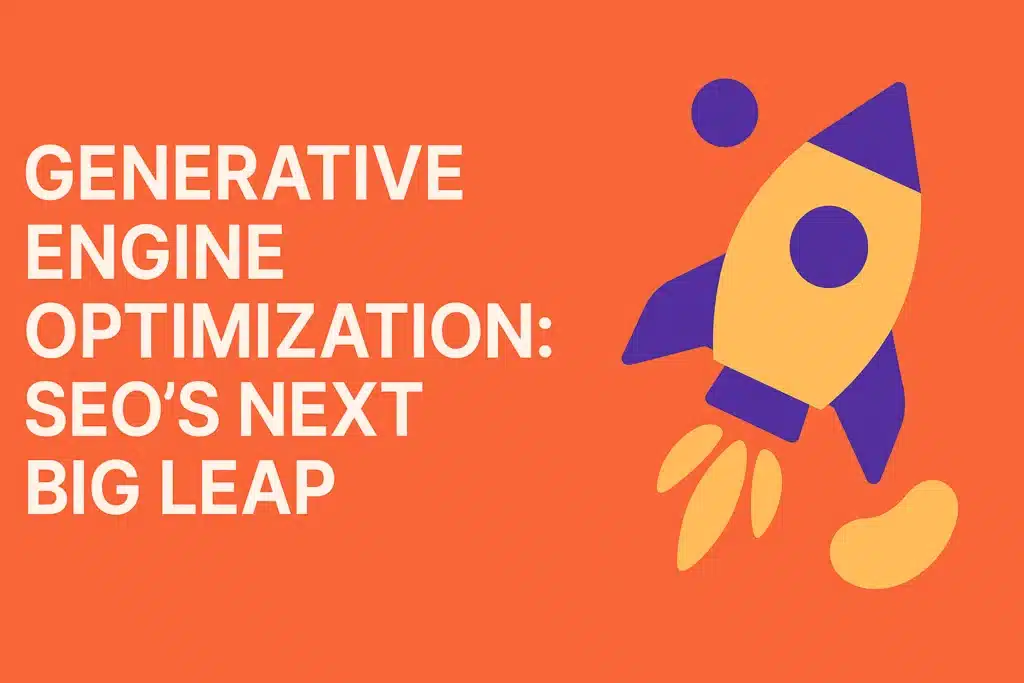Generative Engine Optimization represents a big departure in digital search strategy. Marketers now optimize their content not only to capture clicks but also to secure placement in AI-generated answers. This approach helps brands appear as trusted authorities in evolving search landscapes by requiring changes to old SEO tactics for improved online visibility.
What is generative engine optimization and why it matters now
Generative Engine Optimization focuses on adapting content so that it appears in AI-generated responses rather than usual search results. This new discipline changes SEO practices by focusing on clarity in structured data and including reference-worthy phrases. As chatbots and large language models gain popularity, GEO helps your content is captured as a true source for quick answers. It matters now because search behavior is shifting steadily toward conversational queries, zero-click responses, and the direct delivery of information. Using GEO can increase brand trust and create user engagement in a highly competitive digital landscape.
How SEO has evolved in response to AI-generated content
SEO strategies have shifted a lot as they prioritize structured content, natural language, and clear headings, thus improving the chance of being featured in AI response snippets. Old tactics like keyword stuffing have given way to approaches that generate higher engagement through content quality and a focus on user intent. The increasing spread of AI-driven summaries and generative search results has forced brands to refine their digital methods and maintain real. These techniques help content appear in organic search rankings while improving the visibility of AI-generated overviews.
Why traditional SEO strategies need a reboot
As new search interfaces rise, old SEO faces certain change. Brands can no longer rely only on old techniques that focus solely on keywords and backlinks. The shift to generative answers and AI-driven content demands a complete revision of strategy. Rebooting SEO means reviewing your content structure, rethinking engagement approaches, and changing technical elements that contribute to true search signals. This reboot prioritizes quality summaries and structured data to create better fit with advanced AI-powered search tools. Refining old SEO practices becomes necessary as these systems reshape the rules of digital indexing and user engagement.
The Role of AI and Machine Learning in SEO Shifts
AI and machine learning now guide the evolution of SEO by changing the way search signals and user intent are read. Digital strategies combine deep data analysis and useful insights, blending human creativity with computational precision. By adding these advanced tools, businesses improve their content effectiveness, simplify technical adjustments, and secure higher visibility across various platforms.
How machine learning in SEO powers better content recommendations
Machine learning changes content recommendations by studying large volumes of search data to identify trending topics and long-tail keywords. This new approach improves the interpretation of search intent and increases custom content suggestions. Tools powered by machine learning enhance overall user engagement by predicting needs and optimizing digital presence in real time. As a result, marketers can adjust their content strategies in real time to meet changing search patterns and audience expectations. This technology leads to smarter decisions that match closely with overall SEO goals, ultimately improving visibility and generating higher-quality traffic from search engines while consistently delivering clear results.
Ways artificial intelligence in search ranking reshapes visibility
Artificial intelligence changes search ranking by adding full checks of user intent and content quality, thus improving digital visibility across platforms. It processes millions of queries to understand the details of content that best matches user needs. AI-powered tools assess factors like page speed, site structure, and backlink authority, assigning ranks much more precisely. As brands use these AI guidelines, they enhance metadata, refine site structure, and improve user experience to achieve top search positions. This reshaping encourages a move away from simplistic keyword methods toward related strategies that boost online performance and brand trust.
The importance of LLMs and data training in optimizing content
Large language models (LLMs) enable advanced content optimization by studying user queries and generating text that matches human expression. Data training refines these models, allowing them to understand context, detect emerging trends, and offer practical keyword insights. This results in more effective, targeted content creation that connects well with search algorithms. Adding LLMs into SEO practices shifts the focus from mere keyword density to a detailed understanding of search intent and real-time content gaps, thereby improving organic rankings and overall digital performance. This advanced approach drives clear improvements in both visibility and user engagement across diverse platforms.
Assessing Generative AI’s Impact on SEO Strategies
Generative AI’s influence goes beyond simple content creation as it changes performance metrics and priorities in digital marketing. Marketers must now consider how these AI tools shape user engagement and search outcomes to compete within evolving online systems.
Impact of ChatGPT on SEO and keyword relevance
ChatGPT has changed how content relevance works by providing fast, chat-like answers that bypass old click-through models. AI-generated insights now influence keyword focus and search rankings, pushing brands to deliver content with improved depth and authority. Digital marketers balance speedy content creation with strict quality control to avoid penalties from outdated or unverified data. As search algorithms adapt, using tools like ChatGPT becomes important in maintaining keyword targeting and digital presence across competitive niches, reshaping enterprise SEO strategies and delivering improved performance (seoClarity).
How generative AI affects SEO content and ranking metrics
Generative AI influences SEO by shaping both content creation and the ranking signals used by search engines through advanced language models. Although engines do not penalize AI-generated content outright, quality and originality remain essential. Brands must make sure that AI supports, rather than replaces, human oversight so that related relevance is maintained. Quality content that meets search intent and includes structured data continues to perform better in rankings. The balance between automatic generation and expert editing is important as engines assess depth, clarity, and authority when assigning ranking metrics, thereby securing improved performance and an edge (Skyword).
Risks and limitations of using AI-generated SEO content
AI-generated SEO content carries risks such as potential mistakes, bias, and the creation of duplicate material. Search engines prioritize genuine, quality contributions based on clear authority. Too much use on machine work can lead to a diminished brand voice and reduced user trust. Combining AI output with careful human editing helps manage these limits, so the content remains original, verified, and engaging. This balance, which emphasizes quality review and open disclosure of AI use, protects long-term search performance and follows E-E-A-T standards. Marketers must be careful by adding continuous human oversight to reduce these challenges well (HubSpot).
Conclusion
Generative Engine Optimization offers a changing approach to digital search by connecting human creativity with new AI advancements. Companies that use GEO and add machine learning into their SEO practices can expect improved visibility, deeper engagement, and a stronger sense of authority. Marketers must adapt to evolving user behaviors and update old strategies to meet the new needs of AI-powered answer engines. By balancing new machine work with careful human oversight, brands can secure long-term success and stay competitive. As search engines continue to refine their ranking algorithms and incorporate generative responses, staying ahead with GEO is not just an option—it is essential for thriving in a changing digital landscape.
FAQs
What is generative engine optimization in SEO?
How does the impact of ChatGPT on SEO differ by industry?
What role does machine learning play in SEO improvements?
Is artificial intelligence in search ranking completely algorithm-driven?
How is the future of SEO with generative AI evolving in 2025?
Should human oversight remain critical in generative SEO workflows?

Ridam Khare is an SEO strategist with 7+ years of experience specializing in AI-driven content creation. He helps businesses scale high-quality blogs that rank, engage, and convert.



